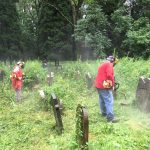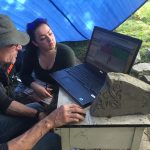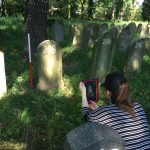In 2016, the Centre of Archaeology was awarded a major grant to research cultural genocide and killing sites in Jewish cemeteries across Europe.

Bierun Stary Jewish Cemetery Photo credit: Professor Caroline Sturdy Colls
Recording Cultural Genocide and Killing Sites in Jewish Cemeteries initially began as a two-year research project, funded by the International Holocaust Remembrance Alliance. Work continues as part of our Field School in Forensic Archaeology programme, which allows us to take our students to Poland to engage in this important research.
The project is a collaboration between Staffordshire University, The Matzevah Foundation and Fundacja Zapomniane. Professor Caroline Sturdy Colls leads the project, which started in July 2016.
This project raises awareness of the causes and consequences of cultural and physical genocide (using Jewish cemeteries desecrated by the Nazis as a pilot case study), directly tackling racism, xenophobia and hostility in the present.
This is achieved by:
(1) Conducting new research into relationships between the destruction of property by Nazis and their collaborators, and the use of religious spaces as killing sites;
(2) Undertaking a series of “social action projects” at selected Jewish cemeteries where cultural and physical genocide occurred in the past, and where neglect and vandalism is occurring presently.
(3) Disseminating the results of (1) and (2) via a state-of-the-art digital platform. The project will adopt a unique interdisciplinary methodology to achieve its aims, utilising techniques from history, archaeology, digital humanities, conservation and community engagement.
The project team began their work in Oświęcim Jewish Cemetery in Poland and the results of this work are available on the project website. In May 2017, the team undertook a survey in Rohatyn, Ukraine in order to document cultural genocide and mass killings at three sites. Follow up work took place in Oświęcim Jewish Cemetery in the summer of 2017 and new research was undertaken in Piaski and Wąwolnica Jewish cemeteries in the Lublin region of Poland. In 2022, the team will return to Poland to undertake new surveys in Częstochowa and Krzepice Jewish cemeteries.
View the project website or Facebook page for more information.
- Cutting the grass in Oświęcim Jewish cemetery.
- Laser scanning matzevah in Oświęcim Jewish cemetery.
- Recording Cultural Genocide and Killing Sites in Jewish Cemeteries



